- Home
- Alex Irvine
Mare Ultima
Mare Ultima Read online
MARE ULTIMA
by
Alex Irvine
I: THE TOMB
They brought the singer to the obsidian gate and waited. A sandstorm began to boil in the valley that split the mountains to their west. Across the miles of desert, they watched it rear and approach. Still the singer did not sing. She was blind, and had the way of blind singers. They were as much at the mercy of the song as anyone else.
All of them were going to die in the sandstorm. At least the guard captain, Paulus, hoped so. If the sandstorm did not kill them, whatever was in the tomb would. Of the two deaths, he much preferred the storm. Two fingers of his right hand touched his throat and he hummed the creed of his god, learned from the Book at the feet of a mother he had not seen since his eighth year. The reflex was all that mattered. The first moon, still low over the mountains, vanished in the storm a moment after the mountains themselves.
The singer began to sing. Paulus hated her for it, but with the song begun, even killing her would not stop it. In one of the libraries hung the severed head of a singer, in a cage made of her bones. No one living could remember who she was, or understand the language of the song. The scholars of the court believed that whoever deciphered the song would know immortality.
They were at the mouth of a valley that snaked down from the mountains and spilled into a flat plain that once had been a marsh, a resting place for migrating birds. The tomb’s architect, according to the scholars, had believed that the soul’s migration was eased by placing the tomb in such a place. In the centuries since the death of the king, his world had also died. The river that fed the marshes shifted course to the south; the desert swept in. Paulus scanned the sky and saw no birds.
At first he found the song pleasing. The melody was unfamiliar to him, in a mode that jarred against the songs he remembered from his boyhood. Then all the gates in his mind boomed shut again. He was not a boy taken into the king’s service who remembered the songs his mother might have sung. He was the guard captain Paulus and he was here in the desert to have the singer sing her song, and then to die.
Why, they had not been told. The tomb was to be opened. Paulus was a soldier. He would open the tomb. In doing so, he would die, but Paulus did not fear death. He had faced it in forms seen by few other men, had survived its proximity often enough that it had grown familiar. Fatalism was an old friend. The song made his teeth hurt; no, not the song, but some effect of the song. In this place, it was awakening something that had slumbered since The Fells was a scattering of huts on the riverbank. This king had died so long ago that his name was lost. At his death the desert had been green. The world changed, aged with the rest of them. In the desert, you breathed the air of a world where everything had happened already, and it made you feel that you could never have existed.
The obsidian gate shifted with a groan and the wind rose. Sand cascaded down the walls, revealing worked stone, as the singer’s song began the work of undoing a burial that had taken the desert centuries to complete. The dozen soldiers with Paulus shifted on their feet, casting glances back and forth between the gate and the approaching storm. They rested hands on sword hilts, gauged the distance to their horses; Paulus could see each of them running through a delicate personal calculation, with the storm on one side and a deserter’s crucifixion on the other.
At the mouth of the tomb, at the end of his life, Paulus had only gossip to steer by. Someone important, a merchant named Jan who had the king’s ear, wanted to free the spirit that inhabited the tomb. The king had agreed. Paulus wondered what favor he owed that made him willing to cast away the lives of a dozen men. Perhaps they would not die. Still, they had ridden nine days across the desert, to a tomb so old and feared that it existed on maps only through inference; the desert road bent sharply away from it, cutting upward to run along the spine of a line of hills to the north before coming back down into the valley and following the ancient riverbed up to the Salt Pass, from which a traveler could see the ocean on a clear day. Paulus wondered what in the tomb had convinced the road builders believe that three days’ extra ride was worth it.
The singer wept, whether in ecstasy or sorrow Paulus could not tell. Swirls of sand reared in the figures of snakes all around them, striking away in the rising wind. The obsidian gate was open an inch. The wind scoured sand away from the front of the tomb, revealing a path of flat stones. Another inch of darkness opened up. The singer’s vibrato shook slivers from the gate that swept away over their heads like slashes of ink inscribed on the sky. Slowly the gate shivered open, grinding across the stones as the singer began to scream. The soldiers broke and ran; Paulus let them go, to die in whatever way they found best. A sound came from the tomb, answering the singer, and the harmony of voices living and dead burst Paulus’ eardrums. Deaf, he felt the wind beat his face. Darkness fell as the storm swallowed the sky. The air grew thick as saliva. The sand undulated like a tongue. From the open gate of the tomb, Paulus smelled the exhalation of an undead spirit. He drew his sword, and then the sandstorm overtook them.
When it had passed, Paulus fumbled for the canteen at his belt. He rinsed his eyes, swished water around in his mouth and spat thick black gunk…onto a floor of even stones. He was in the tomb, without memory of having entered. Water dripped from his beard and he felt the scrape and grind of sand all over his body. He was still deaf. His eardrums throbbed. Where was the rest of the guard? He turned in a slow circle, orienting himself, and stopped when he was facing the open doorway. A featureless sandscape, brushed smooth by the storm and suffused with violet moonlight, stretched to an invisible horizon. The skin on the back of Paulus’ neck crawled. He turned back to face into the tomb, growing curious. He enough oil for a torch. Its light seemed a protective circle to him as he ventured into the tomb to see what might have been left behind when the spirit emerged into the world. What it might do was no concern of his. He had been sent to free it; it was free. The merchant in The Fells had what he had paid for.
Torch held off to his left, sword in his right hand, Paulus walked down the narrow entry hall. He went down a stairway and at the bottom found the open sepulcher. The ancient king’s bones lay as they had been left. His hair wisped over a mail coat that caught the torchlight.
Am I to be a graverobber? Paulus thought. The spirit was fled. Why not?
He took a cutting of the king’s hair, binding it with a bit of leather from the laces of his jerkin. Arrayed about the king’s body were ceremonial articles: a sword pitted and brittle with age, jars which had once held spices and perfumes, the skeletons of a dog and a child. Paulus went through it all, keeping what he knew he could sell and ignoring anything that looked as if it might be infected with magic. He worked methodically, feeling distanced from himself by his deafness. After an hour’s search through the main room of the tomb and an antechamber knee-deep in sand from the storm, he had a double handful of gold coins. Everything else he saw—a sandstone figurine with obsidian eyes, a jeweled torc obscured by the king’s beard, a filigreed scroll case laid diagonally into a wall alcove just inside the door—made him leery of enchantment. The gold would do.
Leaving the tomb, he stumbled over the body of the singer, buried in a drift of sand just inside the shattered gate. There was no sign of the rest of his men. It disturbed Paulus that he had no memory of entering the tomb as the storm broke over them, but memory was a blade with no handle. When it failed, best to live with the failure and live to accumulate new memories. He took another drink, scanned the desert for sign of the horses, and gave up. Either he would walk back, or he could cross the mountains and sail around the Cape of Thirst from the city of Averon. The boat would be quicker and the coastal waters less treacherous than the desert sands. Paulus turned west.
II: THE FELLS
/>
In three days, he was coming down the other side of the pass. Two days after that, he was sleeping in the shadow of wine casks on the deck of a ship called Furioso. On the twelfth day after walking out of the tomb, Paulus stepped off the gangplank into the dockside chaos of The Fells, and wound his way through the city toward the Ridge of the Keep. He wondered how the merchant Jan would know that the spirit was freed, and also how Mikal, the Marshal of the King’s Guard, would react to the loss of his men.
To be the sole survivor of a battle, or of an expedition, was to be assumed a liar. Paulus knew this. He could do nothing about it except tell what portion of the truth would serve him. Any soldier learned that truths told to superiors were necessarily partial.
Mikal received his report without surprise, in fact without much reaction at all. “Understood,” he said at the end of Paulus’ tale. “His Majesty anticipated the possibility of such losses. You have done well to return.” Mikal wrote in the log of the guard. Paulus waited. When he was done writing, Mikal said, “You will return to regular duties once you have repeated your story for Jan Destrier.”
So Paulus walked back through The Fells, from the Ridge of the Keep down into the market known as the Jingle and then upriver past the quay where he had disembarked from Furioso, to tell his story to a man named for a horse. In the Jingle he remembered where as a boy he performed acrobatics for pennies, and where his brother Piero had saved his life by changing him into a dog and then saved it again by trading one of his eyes for a spell. Paulus had not seen his brother in years. So much in one life, he thought. I was a boy, feeding chickens and playing at being a pirate. Then I was in The Fells, rejected from the King’s service. Then I did serve the King, and still do. I have fought in his wars, and killed the men he wanted killed, and now I have released the spirit of a dead king into the world to satisfy an arrangement whose details I will never know.
But whom have I ever stood for the way Piero stood for me?
Jan Destrier’s shopfront faced the river across a cobblestoned expanse that was part street and part quay. There was no sign, but Paulus had been told to look for a stuffed heron in the doorway. He could not remember who had told him. Mikal? Unease roiled his stomach, but his step was sure and steady as he crossed the threshold into Jan Destrier’s shop. The merchant was behind a counter through whose glass top Paulus could see bottles of cut crystal in every shape, holding liquids and pooled gases that caught the light of a lantern hung over Jan Destrier’s head. He was a large man, taller than Paulus and fat in the way men allowed themselves to get fat when their lives permitted it. At first Paulus assumed the bottles held perfume; then he saw the alchemical array on a second table behind the merchant and he understood. Jan Destrier sold magic.
At once Paulus wanted to run, but he was not the kind of man who ran, perhaps because he did not value his life highly enough to abase himself for its sake. He hated magic, hated its unpredictability and the supercilious unction of the men who brokered its sale, hated even more the wizards of the Agate Tower who bound the lives of unknowing men to their own and from the binding drew their power. Once, drunk, Paulus and a groom in the castle stables named Andrew had found themselves arguing over the single best thing a king could do upon ascending the throne. Andrew, hardheaded and practical, wanted a decisive war with the agitating brigands in the mountains to the north; Paulus wanted every wizard and spell broker in The Fells put to the sword. The conversation had started off stupid and gotten worse as the bottle got lighter.
Now here he was in the shop of a broker, sent by a superior on business that concerned the king. Paulus could spit the broker on his sword and watch him die in the facets of his crystal bottles, but he himself would die shortly after. It was not his kingdom and never would be. He was obligated to carry out the orders he had been given.
“Jan Destrier,” he said. “Mikal the king’s marshal sent me to you.”
“You must have something terribly important to tell me, then,” Destrier said. “Tell it.”
“I led a detachment of the guard out into the desert, where the Salt Pass Road bends away from the dry riverbed,” Paulus said. “We had a singer with us. She opened a tomb, and the spirit of the king buried there was freed.” He felt like he should add something about the deaths of the singer and his men, but Jan Destrier would not care. “As you requested,” he finished.
“There has been a misunderstanding,” Destrier said. “I did not wish the spirit to escape.”
Paulus inclined his head. “Beg pardon, that was the order I received.”
“As may be.” Destrier beckoned Paulus around the counter. “Come here.” Paulus did, and the merchant stopped him when he had cleared the counter. “What I wanted was for the spirit to come here. That was what the singer was for. Well, partly.”
“Then permit me to convey my regrets at the failure of the King’s Guard,” Paulus said. “The spirit came out of the tomb, but I did not see it after that. There was a storm.”
“I’m sure there was,” Destrier said. “There almost always is. Never fear, the spirit arrived just as I had hoped.” He held up a brass instrument, all curls and notched edges. Paulus had never seen its like before. “You were kind enough to bring it along with you. Or, perhaps I should say that it was kind enough to bring you along with it.”
No, Paulus thought. If the spirit was there, then it saw me robbing the tomb. He closed his fingers around the cutting of the king’s hair, thinking that if he could destroy the fetish—crisp it in one of the candle flames that burned along the edges of the merchant’s table—that perhaps the spirit would no longer be able to find him. Already he was too late. The spirit, enlivened by some magnetism of the merchant’s, drained the strength from his hands. Paulus felt the whisper of its soul in his brain, like the echo of wind in the black silence of a tomb. His legs were the next to go. His arms jerked out looking for something to hold onto, but nothing was there, and when the numbness crept past his knees, Paulus crumpled to the floor. He felt the paralysis like a drug, spinning his mind away from his body until at last he lost touch even with his senses and fell into a dream that was like dying.
“I thought it would ride the singer,” Jan Destrier said. “How odd that it chose you instead.”
He did not know how long the stupor lasted. When he regained his senses, everything about him was as it had been before: the table littered with alchemical vessels and curling parchment, the border of pinprick candle flames, the batwing eyebrows of the merchant shadowing his eyes. The merchant looked up as Paulus stirred. “You have performed admirably,” he said. “It’s not every man who would have survived the initial possession, and even fewer live to tell of the extraction.”
There would be nothing to tell, Paulus thought. He had no memory of it.
“Where has the spirit gone, then?” he asked. It would come for him, of that he was sure. It had ridden him back to The Fells and now that it was free it would exact some revenge for his spoliation of its tomb. Perhaps it would ride him back, if by coming it had fulfilled whatever geas the merchant had laid on it. Then it would abandon him in the sands to die, the way he had thought he would die when the first notes of the singer’s song had begun to resonate in the stones of the tomb.
“I have it here.” Destrier produced a cucurbit stoppered with wax, and filled with a swirling fluid. “The stopper is made from the catalyst. When I apply heat, it will melt into the impure spirit, and the reaction will precipitate the spirit into another glass. This essence is my stock in trade. You are familiar with the magic market?”
“I know of it,” Paulus said. “I have never made use of it.” This was a lie, but Paulus had no compunction about lying to merchants, who were in his experience congenital liars. Twice in his life, his brother had spent magic on him.
“Well, do keep me in mind if you ever find yourself in need,” the merchant said.
Paulus’ curiosity got the better of him. He framed his question carefully, already outlining a str
ategy for evading and defeating the spirit. But first he had to know as much as possible about its nature. “Is there magic in the spirit because it died having not used its own? How do you know it has any?”
“Magic is more complicated than the nursery rhymes and old wives’ tales would have it,” the merchant said. “Yes, every human is born with a spark, and may use it. But other forms of enchantment and power inhere in the world. In stones, in articles touched by great men or tainted by proximity to unexpected death. These can be refined, their magic distilled and used. This is what I do. In the case of spirits, and whether their magic results from unused mortal power or something else,” he went on, “it is not what the mathematicians would call a zero-sum endeavor. By trapping the spirit, I trap the potential for its magic that it has brought back from the other world. Distilled and processed, this magic can be sold just as any other. Although the nature of the spirit makes such magics unsuitable for certain uses.”
The echoes of the possession still sounded in the hollows of Paulus’ mind. He heard the merchant without active understanding. “We are finished here?” he asked.
“Quite,” the merchant said. “Do convey my commendation of your performance to your superior officers.”
“A commendation would carry more weight coming from yourself,” Paulus said.
The merchant scribbled on a parchment, folded it, and sealed it. “Then let us hope the weight of it does not overburden you,” he said. Paulus left him setting small fires under the alembic that would purify the spirit’s essence into a salable bit of magic.
He delivered the merchant’s commendation to Mikal because not to do so would have been stupid. Then he set about shaping a plan to get that distilled element of magic back from the merchant before he sold it, and in its use an unsuspecting client became a tool for the spirit’s vengeance on Paulus. He did not have enough money to buy the magic and knew that he could not trade his own; the essence of the undead spirit was doubtless more powerful. He could take it by force, but he would have to kill the merchant, and then leave The Fells—and the King’s service—forever. The cowardice of this path repelled him. He owed the King his life. Twice over. He did not love the King, but Paulus understood obligation.

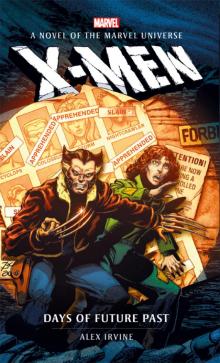 Marvel Novels--X-Men
Marvel Novels--X-Men Tom Clancy's the Division
Tom Clancy's the Division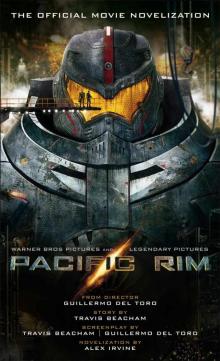 Pacific Rim: The Official Movie Novelization
Pacific Rim: The Official Movie Novelization Anthropocene Rag
Anthropocene Rag Black Lagoon
Black Lagoon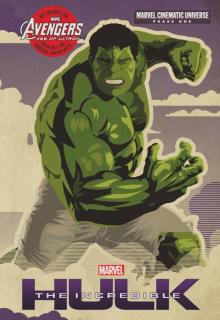 Phase One: The Incredible Hulk
Phase One: The Incredible Hulk Phase One: Iron Man
Phase One: Iron Man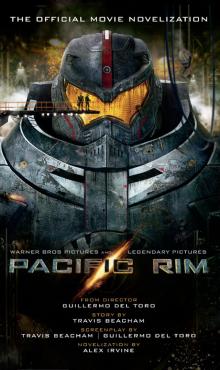 Pacific Rim
Pacific Rim Pacific Rim Uprising--Official Movie Novelization
Pacific Rim Uprising--Official Movie Novelization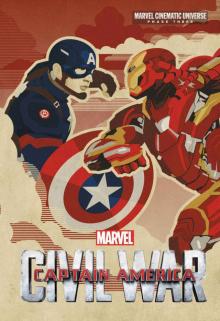 Phase Three: Marvel's Captain America: Civil War
Phase Three: Marvel's Captain America: Civil War Phase One: Thor
Phase One: Thor Dawn of the Planet of the Apes: The Official Movie Novelization
Dawn of the Planet of the Apes: The Official Movie Novelization Phase One: Marvel's The Avengers
Phase One: Marvel's The Avengers Phase One: Captain America
Phase One: Captain America Exiles
Exiles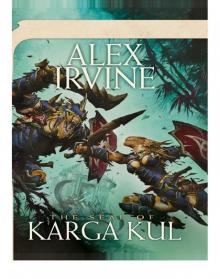 The Seal of Karga Kul: A Dungeons & Dragons Novel
The Seal of Karga Kul: A Dungeons & Dragons Novel Marvel's Ant-Man - Phase Two
Marvel's Ant-Man - Phase Two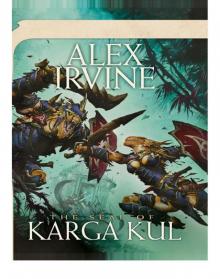 The seal of Karga Kul (dungeons and dragons)
The seal of Karga Kul (dungeons and dragons) Mare Ultima
Mare Ultima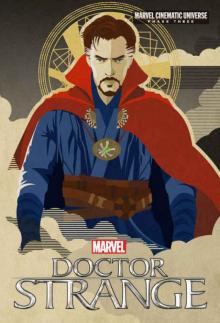 Phase Three: MARVEL's Doctor Strange
Phase Three: MARVEL's Doctor Strange MARVEL SUPER HEROES SECRET WARS
MARVEL SUPER HEROES SECRET WARS Phase Three: MARVEL's Guardians of the Galaxy Vol. 2
Phase Three: MARVEL's Guardians of the Galaxy Vol. 2 Dawn of the Planet of the Apes
Dawn of the Planet of the Apes Independence Day: Resurgence: The Official Movie Novelization
Independence Day: Resurgence: The Official Movie Novelization